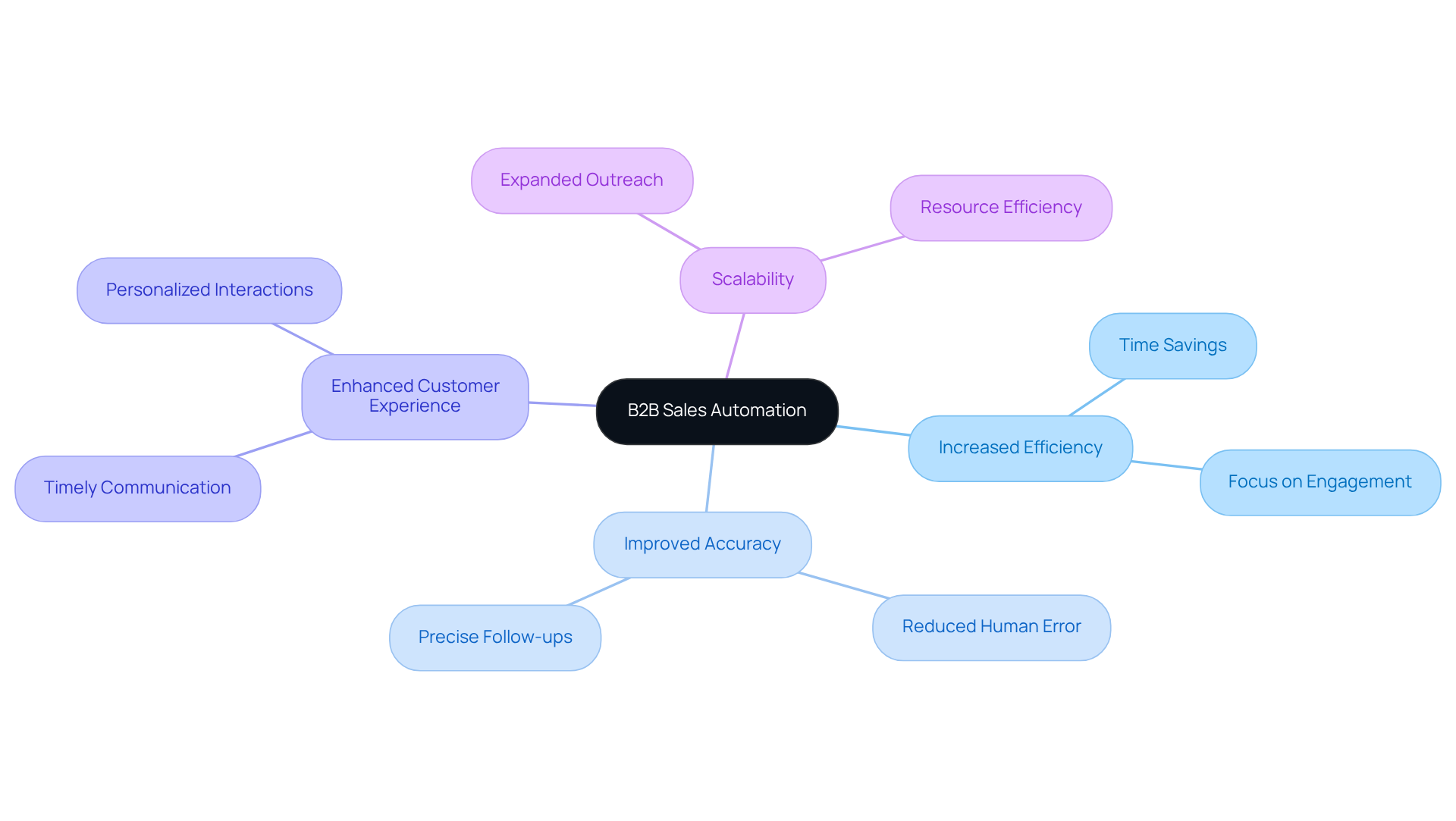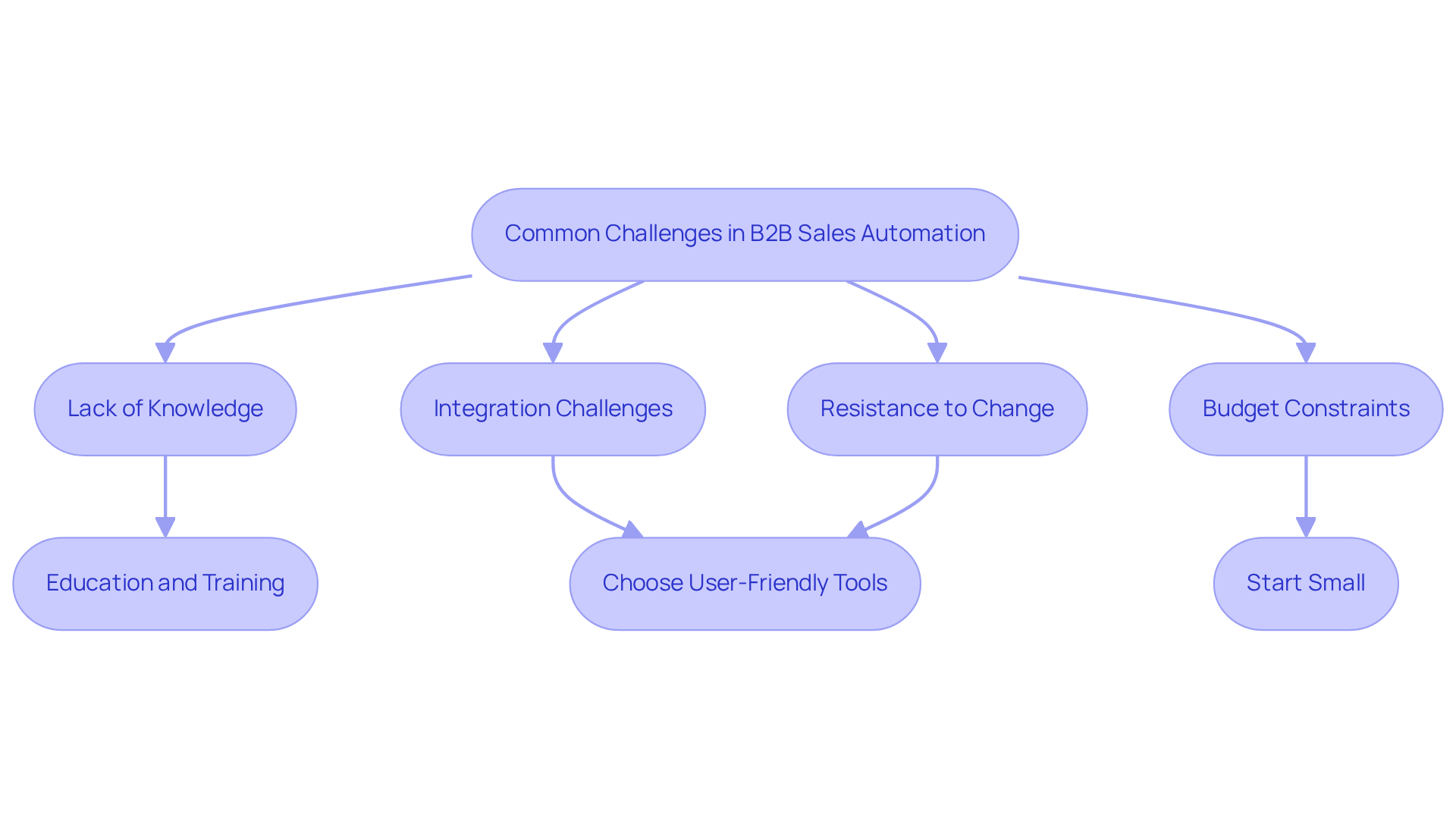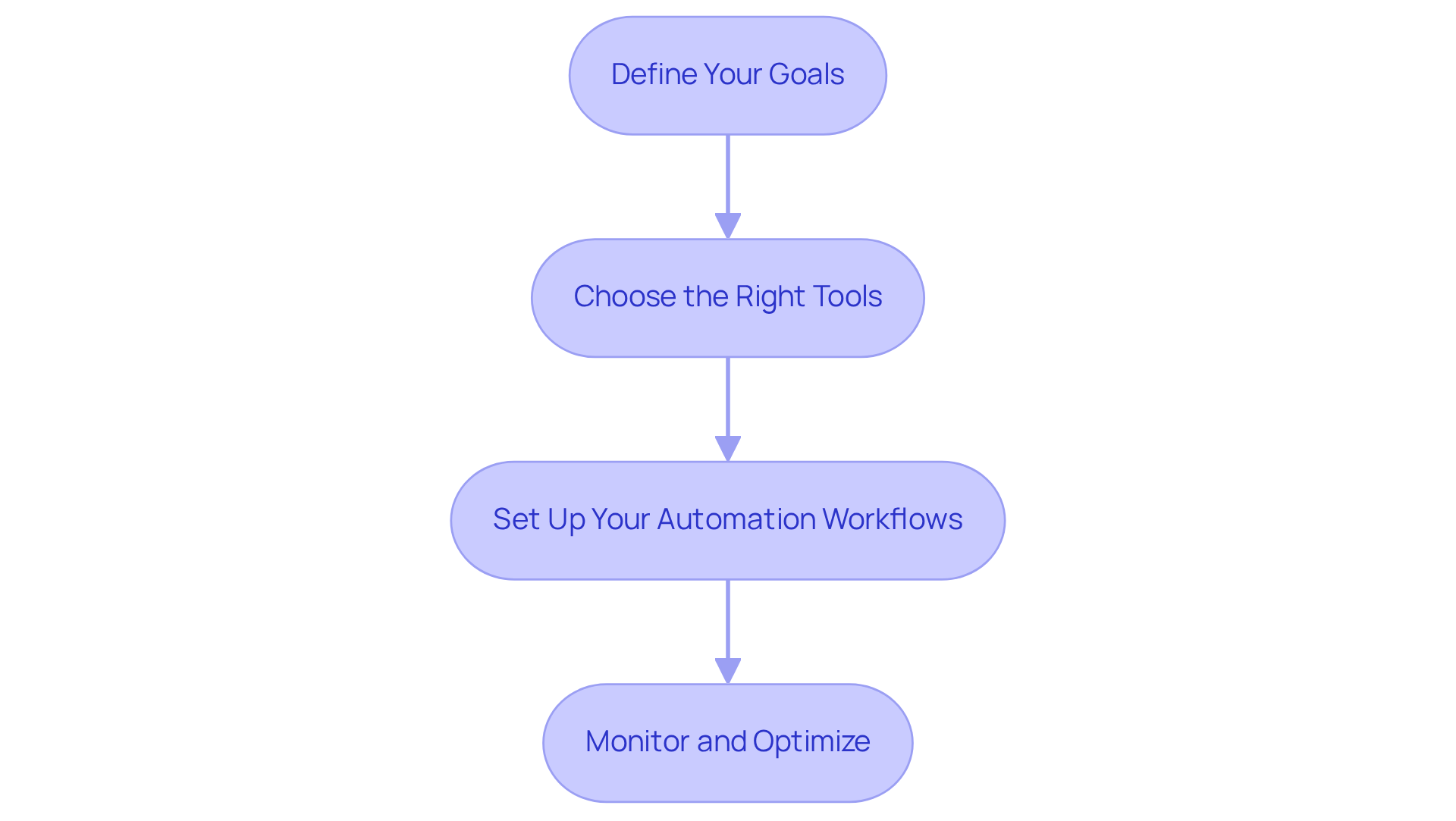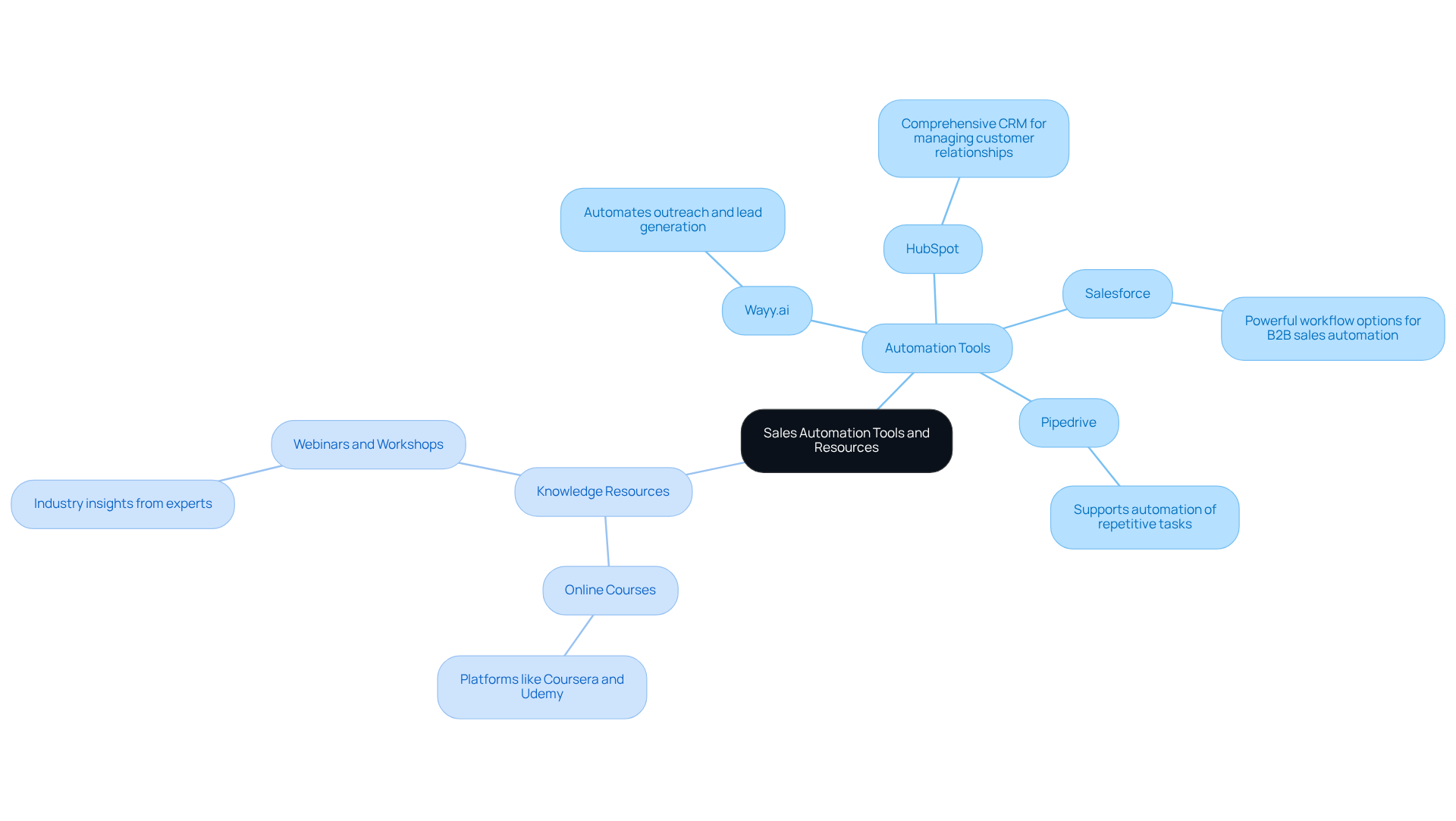Overview
This article presents a four-step process designed to help small businesses excel in B2B sales automation. We begin by recognizing the importance of defining clear goals. Next, we explore how to select the right tools tailored to your needs. Setting up effective workflows follows, ensuring that your operations run smoothly. Finally, we emphasize the necessity of monitoring performance to continually improve your strategies.
Throughout this structured approach, we highlight the many benefits of automation. Imagine increased efficiency and a significantly improved customer experience—these are not just possibilities, but achievable outcomes. However, we also understand that implementing these changes can come with challenges. That's why we provide supportive strategies to help you navigate these common hurdles with confidence.
Together, we can tackle these challenges and unlock the full potential of your business. By following these steps, you’re not just automating processes; you’re enhancing your overall business strategy and creating a more fulfilling experience for your customers.
Introduction
B2B sales automation has emerged as a transformative strategy for small businesses, offering a valuable pathway to streamline operations and enhance efficiency. By automating repetitive tasks such as lead generation and customer follow-ups, small enterprises can concentrate on what truly matters—building meaningful relationships with their clients.
Yet, the journey toward implementing sales automation is not without its challenges. From budget constraints to resistance to change, small business owners often face significant hurdles.
How can we navigate these obstacles together and fully harness the power of automation to drive growth and success? Your journey is important, and understanding these challenges is the first step toward finding effective solutions.
Understand B2B Sales Automation and Its Importance
B2B sales automation is a powerful tool that uses technology to simplify and streamline various transaction processes, including lead generation and customer relationship management. For small enterprises, this approach is particularly beneficial, as it reduces the burden of manual tasks, enhances efficiency, and allows teams to focus on building meaningful connections with potential clients. By utilizing b2b sales automation to automate repetitive activities like follow-ups, data entry, and lead scoring, businesses can significantly improve their revenue performance and conversion rates. Understanding the importance of is the first step toward unlocking its full potential for sustainable growth.
Key Benefits of B2B Sales Automation:
- Increased Efficiency: Automating routine tasks frees up precious time for sales teams to engage with prospects meaningfully.
- Improved Accuracy: This technology helps reduce human error in data entry and follow-ups, ensuring your efforts are precise.
- Enhanced Customer Experience: With timely and personalized communication, you can foster better relationships with your customers.
- Scalability: Automation empowers enterprises to expand their outreach efforts without a corresponding increase in resources.
As you consider these advantages, reflect on how automation could alleviate some of your daily challenges. Together, we can harness the power of technology to implement b2b sales automation, which will create a more efficient and rewarding sales process for your business.

Identify Common Challenges in B2B Sales Automation for Small Businesses
While offers numerous advantages, we understand that small enterprises often encounter unique challenges during implementation. Let’s explore some common obstacles you might face:
- Lack of Knowledge: It’s not uncommon for small business owners to feel unsure about how to effectively utilize automation tools.
- Integration Challenges: Incorporating new resources with existing systems can be daunting and may hinder your b2b sales automation efficiency efforts.
- Budget Constraints: Limited financial resources can restrict access to advanced mechanization tools that could benefit your business's b2b sales automation.
- Resistance to Change: Employees might be hesitant to embrace b2b sales automation technologies, fearing job loss or added complexity.
Now, how can we overcome these challenges together? Here are some supportive strategies:
- Education and Training: Investing in training sessions can help familiarize your team with automation tools, making the transition smoother.
- Start Small: Consider beginning with basic automated features, gradually expanding as your team grows more comfortable.
- Choose User-Friendly Tools for B2B Sales Automation: Opting for platforms that offer seamless integration and are easy to navigate can significantly ease the process of B2B sales automation.
By addressing these challenges with understanding and practical solutions, we can work towards a more efficient and empowered business environment.

Follow a Step-by-Step Process to Implement B2B Sales Automation
Implementing b2b sales automation can be a straightforward journey when approached with care and methodical planning. Let’s explore a step-by-step guide that can empower you:
- Define Your Goals
First, take a moment to identify the specific objectives you wish to achieve through automation. Are you looking to increase lead generation or perhaps improve follow-up rates? Understanding your goals is the first step toward meaningful progress. - Choose the Right Tools
Next, research and select automation tools that truly align with your business needs. Consider factors such as ease of use, integration capabilities, and cost. Remember, b2b sales automation tools can make a significant difference in your efficiency. - Set Up Your Automation Workflows
Now, create workflows that automate those repetitive tasks that can often feel overwhelming. For instance, you might set up automated email sequences for nurturing leads or reminders for follow-ups. These small steps can lead to big improvements in your daily operations. - Monitor and Optimize
Finally, regularly review your automation performance metrics. Use the insights you gather to refine your workflows and enhance efficiency. Adjust your strategies based on what resonates best with your audience. Together, we can navigate this process and achieve success.

Leverage Tools and Resources for Effective Sales Automation
To fully harness the benefits of B2B sales automation technology, it's essential to utilize the right resources. We understand that as a small business owner, navigating these options can feel overwhelming. Here are some tools that can truly make a difference in your sales efforts:
- Wayy.ai: This AI-driven platform automates outreach and lead generation, making it an excellent choice for small business owners eager to streamline their sales processes.
- HubSpot: A comprehensive CRM that simplifies managing customer relationships and streamlining marketing activities, HubSpot can be a game-changer for your business.
- Salesforce: Known for its powerful capabilities, Salesforce offers comprehensive workflow options that are ideal for companies looking to implement B2B sales automation and expand their revenue processes.
- Pipedrive: This intuitive sales management application supports B2B sales automation by helping automate repetitive tasks and effectively monitor sales activities, allowing you to focus on what truly matters.
Additionally, consider these resources to further enhance your understanding:
- Online Courses: Platforms like Coursera and Udemy provide valuable courses on sales automation and CRM tools, empowering you with knowledge.
- Webinars and Workshops: Attend industry webinars that offer insights from experts, helping you learn best practices for B2B sales automation.
Together, these tools and resources can support you in overcoming challenges and achieving success in your sales journey.

Conclusion
B2B sales automation stands out as an essential strategy for small businesses eager to improve their sales processes and build stronger relationships with clients. By harnessing technology to automate repetitive tasks, you can shift your focus toward meaningful interactions, ultimately driving revenue growth and enhancing efficiency.
Throughout this discussion, we’ve highlighted several key advantages of B2B sales automation. These include:
- Increased efficiency
- Improved accuracy
- An enhanced customer experience
- The ability to scale your operations
We also acknowledge the common challenges small enterprises face, such as:
- Knowledge gaps
- Integration hurdles
- Budget limitations
- Resistance to change
Together, we can explore practical strategies to overcome these obstacles, ensuring a smoother transition to automated processes.
In reflection, embracing B2B sales automation is not merely a trend; it represents a vital evolution for small businesses striving for sustainable growth. By identifying your specific goals, selecting the right tools, and continuously optimizing your workflows, you can unlock the full potential of automation. Taking action today can lead to significant improvements in your sales performance and customer satisfaction, paving the way for long-term success in an increasingly competitive landscape. Remember, you are not alone in this journey; together, we can navigate the path to success.
Frequently Asked Questions
What is B2B sales automation?
B2B sales automation is a technology-driven approach that simplifies and streamlines various transaction processes, including lead generation and customer relationship management, particularly beneficial for small enterprises.
How does B2B sales automation benefit small enterprises?
It reduces the burden of manual tasks, enhances efficiency, and allows teams to focus on building meaningful connections with potential clients.
What repetitive activities can be automated in B2B sales?
Repetitive activities that can be automated include follow-ups, data entry, and lead scoring.
What are the key benefits of B2B sales automation?
The key benefits include increased efficiency, improved accuracy, enhanced customer experience, and scalability.
How does B2B sales automation increase efficiency?
Automating routine tasks frees up time for sales teams to engage more meaningfully with prospects.
In what way does B2B sales automation improve accuracy?
It helps reduce human error in data entry and follow-ups, ensuring that efforts are precise.
How does B2B sales automation enhance customer experience?
It allows for timely and personalized communication, fostering better relationships with customers.
What does scalability mean in the context of B2B sales automation?
Scalability refers to the ability of enterprises to expand their outreach efforts without needing to increase resources proportionally.
Why is understanding the importance of revenue automation crucial?
Understanding its importance is the first step toward unlocking its full potential for sustainable growth in businesses.




